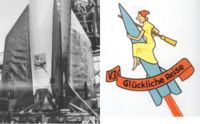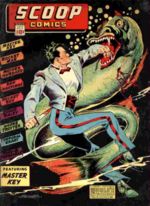Difference between revisions of "Pages 359-371"
(New page: {{GR PbP Text}} ==Page 360== '''cadence being counted by a Negro voice—yo lep, yo lep, yo lep O right O lep'''<br /> Syncopated cadence for the march of the American workers: "your left...) |
|||
| Line 2: | Line 2: | ||
==Page 360== | ==Page 360== | ||
| − | '''cadence being counted by a Negro voice—yo lep, yo lep, yo lep O right O lep'''<br /> | + | 360.21-22 '''cadence being counted by a Negro voice—yo lep, yo lep, yo lep O right O lep'''<br /> |
Syncopated cadence for the march of the American workers: "your left . . . " The work detail is presumably black, since the Armed Services were not integrated until after the war. | Syncopated cadence for the march of the American workers: "your left . . . " The work detail is presumably black, since the Armed Services were not integrated until after the war. | ||
==Page 361== | ==Page 361== | ||
| − | [[image:rocket-insignia.jpg|thumb|200px|right]]'''insigne'''<br /> | + | [[image:rocket-insignia.jpg|thumb|200px|right]]361.5 '''insigne'''<br /> |
[[Weisenburger's Companion to Gravity's Rainbow|Weisenburger]] explains "insigne" as being the latin spelling for a sign or mark. In fact, ''insigne'' is the singular form of the more familiar 'insignia', which is the plural form. That said, the photos to the right are of the A4 V3 (version 3) before launch from Test Stand VII on August 16 1942. The photo shows the V3 insigne, a (less than) pretty witch astride a rocket, carrying her obsolete broom. The color illustration is an artist's impression of the insigne. The inscription means Bon Voyage. Both images are from ''V Weapons of the 3rd Reich'' by Dieter Holsken (Monogram 1994) | [[Weisenburger's Companion to Gravity's Rainbow|Weisenburger]] explains "insigne" as being the latin spelling for a sign or mark. In fact, ''insigne'' is the singular form of the more familiar 'insignia', which is the plural form. That said, the photos to the right are of the A4 V3 (version 3) before launch from Test Stand VII on August 16 1942. The photo shows the V3 insigne, a (less than) pretty witch astride a rocket, carrying her obsolete broom. The color illustration is an artist's impression of the insigne. The inscription means Bon Voyage. Both images are from ''V Weapons of the 3rd Reich'' by Dieter Holsken (Monogram 1994) | ||
==Page 365== | ==Page 365== | ||
| − | '''Grosser Stern'''<br /> | + | 365.13 '''Grosser Stern'''<br /> |
This reference is not to a street but to a crossing in the Tiergarten. | This reference is not to a street but to a crossing in the Tiergarten. | ||
==Page 366== | ==Page 366== | ||
| − | '''Tonto'''<br /> | + | 366.12 '''Tonto'''<br /> |
See [[Pages 735-760#Page752|note for page 752]] | See [[Pages 735-760#Page752|note for page 752]] | ||
| − | [[image:scoop-comics.jpg|thumb|150px|right]]'''Raketemensch!'''<br /> | + | [[image:scoop-comics.jpg|thumb|150px|right]]366.14 '''Raketemensch!'''<br /> |
The comic book hero Rocketman originated (along with Rocketgirl) in ''Scoop Comics'' #1, published by Harry "A" Chesler, in 1941. In 1943, the heroes were featured in Harvey Comics’ ''Hello, Pal Comics'', beginning with issue #1. The cover of the 1952 Ajax ''Rocketman Comics'' (mentioned by Weisenburger) is reproduced in the 1989 edition of the ''Comic Buyers Price Guide'': the hero depicted on the cover wears a rig that looks more like a diving helmet than a nosecone. [[#Page 383|See note below at p. 382]]. | The comic book hero Rocketman originated (along with Rocketgirl) in ''Scoop Comics'' #1, published by Harry "A" Chesler, in 1941. In 1943, the heroes were featured in Harvey Comics’ ''Hello, Pal Comics'', beginning with issue #1. The cover of the 1952 Ajax ''Rocketman Comics'' (mentioned by Weisenburger) is reproduced in the 1989 edition of the ''Comic Buyers Price Guide'': the hero depicted on the cover wears a rig that looks more like a diving helmet than a nosecone. [[#Page 383|See note below at p. 382]]. | ||
| − | '''a four-color dispensation'''<br /> | + | 366.24-25 '''a four-color dispensation'''<br /> |
In other words, a comic-book scene, printed in color. The four-color printing process (including magenta, cyan, yellow, and black), which allows a full range of colors to be represented, was perfected in the early 1930s. [[Pages 60-71#Page 69|See note for p. 69]] | In other words, a comic-book scene, printed in color. The four-color printing process (including magenta, cyan, yellow, and black), which allows a full range of colors to be represented, was perfected in the early 1930s. [[Pages 60-71#Page 69|See note for p. 69]] | ||
==Page 370== | ==Page 370== | ||
| − | '''Seaman Bodine'''<br /> | + | 370.01 '''Seaman Bodine'''<br /> |
"Pig" Bodine, Pynchon’s most enduring character, originating in the short story "Lowlands" and continuing in ''V.'' An ancestor of Bodine’s appears in [http://masondixon.pynchonwiki.com/wiki/ ''Mason & Dixon''], as well as in [http://against-the-day.pynchonwiki.com/wiki/ ''Against the Day'']. | "Pig" Bodine, Pynchon’s most enduring character, originating in the short story "Lowlands" and continuing in ''V.'' An ancestor of Bodine’s appears in [http://masondixon.pynchonwiki.com/wiki/ ''Mason & Dixon''], as well as in [http://against-the-day.pynchonwiki.com/wiki/ ''Against the Day'']. | ||
| − | '''The Green Hershey Bar'''<br /> | + | 370.37 '''The Green Hershey Bar'''<br /> |
That is, the hashish. | That is, the hashish. | ||
{{GR PbP}} | {{GR PbP}} | ||
Revision as of 23:23, 5 March 2007
This page-by-page annotation is organized by sections, as delineated by the seven squares (sprockets) which separate each section. The page numbers for this page-by-page annotation are for the original Viking edition (760 pages). Editions by other publishers vary in pagination — the newer Penguin editions are 776 pages; the Bantam edition is 886 pages.
Contributors: Please use a 760-page edition (either the original Viking edition with the orange cover or the Penguin USA edition with the blue cover and rocket diagram — there are plenty on Ebay for around $10) or search the Google edition for the correct page number. Readers: To calculate the Bantam edition use this formula: Bantam page # x 1.165. Before p.50 it's about a page earlier; as you get later in the book, add a page.
Finally, profound thanks to Prof. Don Larsson for providing the foundation for this page-by-page annotation.
Contents
Page 360
360.21-22 cadence being counted by a Negro voice—yo lep, yo lep, yo lep O right O lep
Syncopated cadence for the march of the American workers: "your left . . . " The work detail is presumably black, since the Armed Services were not integrated until after the war.
Page 361
361.5 insigneWeisenburger explains "insigne" as being the latin spelling for a sign or mark. In fact, insigne is the singular form of the more familiar 'insignia', which is the plural form. That said, the photos to the right are of the A4 V3 (version 3) before launch from Test Stand VII on August 16 1942. The photo shows the V3 insigne, a (less than) pretty witch astride a rocket, carrying her obsolete broom. The color illustration is an artist's impression of the insigne. The inscription means Bon Voyage. Both images are from V Weapons of the 3rd Reich by Dieter Holsken (Monogram 1994)
Page 365
365.13 Grosser Stern
This reference is not to a street but to a crossing in the Tiergarten.
Page 366
366.12 Tonto
See note for page 752
The comic book hero Rocketman originated (along with Rocketgirl) in Scoop Comics #1, published by Harry "A" Chesler, in 1941. In 1943, the heroes were featured in Harvey Comics’ Hello, Pal Comics, beginning with issue #1. The cover of the 1952 Ajax Rocketman Comics (mentioned by Weisenburger) is reproduced in the 1989 edition of the Comic Buyers Price Guide: the hero depicted on the cover wears a rig that looks more like a diving helmet than a nosecone. See note below at p. 382.
366.24-25 a four-color dispensation
In other words, a comic-book scene, printed in color. The four-color printing process (including magenta, cyan, yellow, and black), which allows a full range of colors to be represented, was perfected in the early 1930s. See note for p. 69
Page 370
370.01 Seaman Bodine
"Pig" Bodine, Pynchon’s most enduring character, originating in the short story "Lowlands" and continuing in V. An ancestor of Bodine’s appears in Mason & Dixon, as well as in Against the Day.
370.37 The Green Hershey Bar
That is, the hashish.
| 1 Beyond the Zero |
3-7, 7-16, 17-19, 20-29, 29-37, 37-42, 42-47, 47-53, 53-60, 60-71, 71-72, 72-83, 83-92, 92-113, 114-120, 120-136, 136-144, 145-154, 154-167, 167-174, 174-177 |
|---|---|
| 2 Un Perm' au Casino Herman Goering |
181-189, 189-205, 205-226, 226-236, 236-244, 244-249, 249-269, 269-278 |
| 3 In the Zone |
279-295, 295-314, 314-329, 329-336, 336-359, 359-371, 371-383, 383-390, 390-392, 392-397, 397-433, 433-447, 448-456, 457-468, 468-472, 473-482, 482-488, 488-491, 492-505, 505-518, 518-525, 525-532, 532-536, 537-548, 549-557, 557-563, 563-566, 567-577, 577-580, 580-591, 591-610, 610-616 |
| 4 The Counterforce |
617-626, 626-640, 640-655, 656-663, 663-673, 674-700, 700-706, 706-717, 717-724, 724-733, 733-735, 735-760 |

